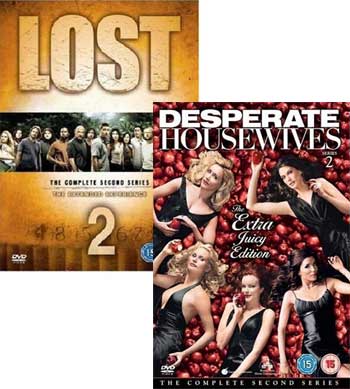Can we really quantify how much 'free' TV downloads distort the value of the market?
With the release last week of the BBC Trust's provisional findings into the proposed iPlayer on demand service, there has been a lot of focus in the places where I hang out online on the market impact of downloads and piracy.
After several attempts over the last few months, I resigned myself to the fact that I was never going to be online long enough to BitTorrent down the Season 2 box sets of 'Lost' and 'Desperate Housewives'. Realising that the thIRd series of both were beginning to air, and that the length of time we could go without encountering spoilers for both was limited, I finally bit the bullet and bought them both for my wife's birthday present.

We have 30 evenings left between now and when we next leave for the UK, and so with 24 episodes each we should have enough TV to watch between then and now. Although if we continue "binge-watching" in the way we've started out - two episodes of each show an evening - we'll have the whole thing done by the middle of next week.
So, for me, it was an interesting reflection on some of the things going on in the UK about downloading music and TV shows, and in OFCOM's findings about the BBC's proposed iPlayer.
Some sides of the argument suggest that consumers will consume a certain number of hours of material, and will continue to pay for products to fill that time. That means that free downloads from podcasters such as the BBC or Virgin Radio, or the football weekly shows from The Guardian or The Times, eats in to the amount of money consumers would otherwise have spent. Thus the iPlayer is seen as a threat to the pay-per-download business models of something like Channel 4's 4OD, or DVD rentals.
I tend towards the other side of the argument, which is that consumers have a certain amount of money to spend on entertainment, and will fill the rest of the time up with free alternatives. And if the free alternative were not there, it wouldn't necessarily increase consumer spending. Case in point, by a combination of BitTorrent and people posting us DVDs in Austria (and in Greece before that), we've seen all of the recent Doctor Who shows and most of Torchwood. Now, if that hadn't been the case, buying 'Lost' and 'Desperate Houswives' wouldn't have even come into my consideration. I would have spent the same amount of money, but would have bought Doctor Who related gear instead.

In fairness to OFCOM, their market impact report acknowledged that free downloads from the BBC would help get people used to the technology and stimulate demand for similar services from other providers.
But what interests me here is something which I'm not convinced OFCOM and others necessarily take into consideration properly when they talk about the market impact of either piracy or of free downloaded content, for TV shows or especially for the downloading of music. For me the availability, or non-availabilty, of free downloads (either legitimate or not legitimate) is a factor in where I spend my DVD money, but not how much DVD money I spend. In this case the BBC's loss is quite clearly Buena Vista Home Entertainment's gain, but I don't think I've caused the overall UK DVD market to shrink as a result. If we hadn't got hold of the "free" stuff, I expect we would just filled up the time playing cards instead.
the views expressed on currybetdotnet are my own, and do not reflect the views of my current or former employers.